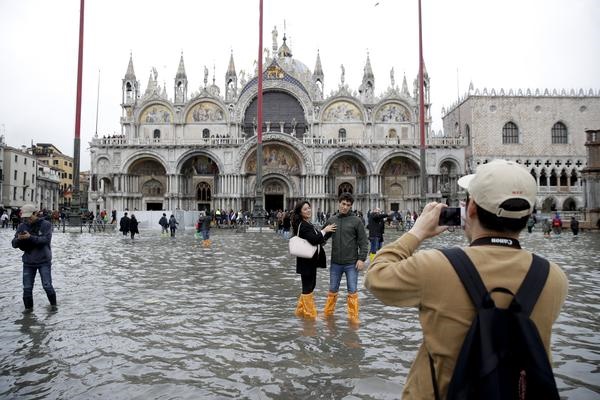The Italian city of Venice introduced a new scheme on Thursday that requires day visitors to pay a fee to gain access to the historic city.
This is a first for the world, with the aim of relieving the pressure that tourism applies to the city.
Day visitors to this Unesco world heritage site will now have to buy a ticket of €5.30 (about R110), with inspectors who will be visible at key access points.
Venice is considered one of the most beautiful cities and is one of the world’s top tourist destinations.
However, according to the authorities, this city is drowning under the weight of the crowds of tourists.
According to Simone Venturini, the local councilor responsible for the city’s tourism, a total of 10,000 tickets had already been sold by the time the scheme started on Thursday morning.
However, the scheme is in a test phase and comes into effect on the 29 busiest days throughout the year, mostly on weekends in May and July. Today (Thursday) is Liberation Day in Italy, making it a holiday and a busy day for tourists.
There is no limit to the number of tickets available, and the aim is instead to encourage day visitors to visit the city at quieter times.
“I think this is a good thing, because it will perhaps decrease the tourist numbers in Venice,” says Sylvain Pelerin, a French tourist who has been visiting the city for more than 50 years.
Overnight visitors, who already pay a tourist tax, are exempted from the daily fee. Children under 14 years old also get free entry.
However, not everyone is equally happy with the new institution, with some residents planning to protest against a measure that they say hinders the basic right to freedom of movement.

“This is not a museum. It’s a protected, ecological area, and you shouldn’t have to pay for it, it’s a city,” says Marina Dodino of the local residents’ association, ARCI, to AFP.
According to Luigi Brugnaro, the mayor of Venice, the new scheme is an “experiment” which is monitored with “very soft controls” and “without queues”.
Visitors are encouraged to purchase their tickets online in advance, but will also be able to purchase a ticket on arrival.
A new ticket office has been set up in the square in front of the Santa Lucia train station, the main access point to the city.
Inspectors will impose a fine of between €50 and €300 (about R1 000 to R6 000) on those without a ticket.
Venice is spread over more than 100 small islands in the north-east of Italy and was declared a world heritage site by Unesco in 1987.
The number of visitors to the city, described by the United Nations (UN) as an “extraordinary architectural masterpiece”, is widely considered unsustainable.
In peak times, around 100,000 visitors spend the night in the historic city at the same time; this while the city only has 50,000 permanent residents.
Tens of thousands of people stream daily through the city’s narrow paths and regularly arrive on boats to see, among other things, the St. Mark’s Square and the Rialto Bridge.
“The goal is to find a new balance between tourism and the city’s residents,” says Venturini.
“We must work together to improve the impact of day-to-day tourism on certain days, which is a major source of pressure on the city.”
Already in 2021, Venice imposed a ban on massive boats that brought thousands of day visitors to the city every day and is now redirecting the boats to a more remote, industrial port.









